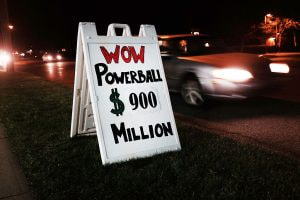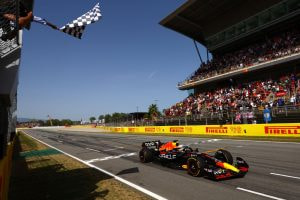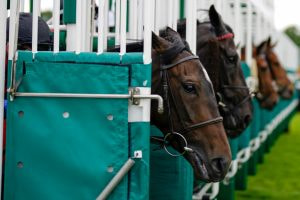Who Has Set the Records at F1’s Home Track, Silverstone?
With a history dating back to 1948, the British Grand Prix at Silverstone is one of the most prestigious races on the motor racing calendar. In 1950 the Silverstone circuit hosted the first-ever World Championship Formula 1 race. It has been a race positioned on the top of Formula 1 drivers’ wish lists ever since.

Nigel Mansell won the British Grand Prix four times. After receiving the chequered flag in 1991, he famously gave Ayrton Senna a lift back to the pits when the Brazilian ran out of fuel. ©GettyImages
Silverstone winners at Formula 1 level include Ayrton Senna, Michael Schumacher, and Damon Hill. But Silverstone – a venue situated within 60 miles of the factories of six of Formula 1s current teams – has and does stage many different categories of motorsport. It is also a favourite amongst Formula 1 betting fans.
Here you can read the story behind the outstanding Silverstone winners of the British Grand Prix, plus other races in different categories and formulas. You can also compare the statistics of the most successful teams and learn about some of the unusual and sometimes disastrous happenings at the Northamptonshire circuit.
Royal Approval From King George VI
Silverstone – commonly described as the ‘Home of British Motorsport’ – sits on the site of a World War II Royal Air Force airfield. It opened in 1943 with three runways in a triangular format. Following the war, in 1947, enthusiasts took the opportunity to race cars on the landing strips that then sat abandoned.
Just a year later, the Royal Automobile Club took a 12-month lease on the airfield (later extended) and organised the first British Grand Prix of the modern era. Resultantly the list of British GP winners is headed by the Italian Luigi Villoresi, who drove a Maserati.
It is estimated 150,000 spectators lined Silverstone for the first official Formula 1 race staged two years later. The most important of these was King George VI, who attended the race with Princess Elizabeth, Princess Margaret, and Lord and Lady Mountbatten. It remains the only time a reigning monarch has attended a British motor race.
The Royal Family at the 1950 British Grand Prix pic.twitter.com/6Dz2m6E9b7
— Sports & Betting History by BestBettingSites (@CDCHistory) April 11, 2018
It is another Italian, Giuseppe Farina, that therefore heads the list of Silverstone F1 winners. Before the King, the 44-year-old led home an Alpha Romeo 1-2-3. Amongst the field – but succumbing to a mechanical breakdown – was Juan Manuel Fangio who is now recognised as the greatest Formula 1 driver of all time. The Argentinian would eventually join the Silverstone winners’ list in 1956.
Lauda Was Never a Silverstone Winner
The Silverstone circuit and its facilities have undergone many changes over the decades. The last 30 years have seen the track majorly redesigned twice, and there have been numerous subtle updates to the circuit’s layout.
And Silverstone has not always been the exclusive home of the British Grand Prix. Between the mid-1950s and early 1960s, the circuit and Aintree would stage the race on alternating years. For 24 years, from 1963 onwards, Silverstone shared British Grand Prix hosting duties with Brands Hatch. Again, the venue would alternate every 12 months.
The arrangement meant – despite being a three-time British Grand Prix winner (1976, 1982, 1984) – Niki Lauda was never a Silverstone Grand Prix winner. Nigel Mansell took the final British GP staged at Brands Hatch in 1986. He would top the Silverstone winner’s podium three times before his retirement.
Since 1987 the British Grand Prix has been staged exclusively at Silverstone. There have been just five individual British Grand Prix winners since. However, Lewis Hamilton, Nigel Mansell, and David Coulthard have collectively taken the race a dozen times.
Below is a short Q&A to give you more information about the British Grand Prix at Silverstone.
When is the British Grand Prix?
The British Grand Prix has a traditional mid-July slot on the Formula 1 calendar. However, in 2000 the race took place in April, coinciding with Easter Sunday. For spectators, it was a disaster as heavy rain had turned the fields used as car parks into mud baths. Some were closed on race day. Of those that opened, it took days for tractors to pull all cars out of the quagmire.
Is the British Grand Prix a good race to attend?
400,000 fans attend Silverstone over the three-day Formula 1 meeting. The figures suggest it is an excellent spectacle. Silverstone also has a motor racing museum that is well worth a visit. Within that, there is a state-of-the-art simulator experience that is open to the public.
During the Formula 1 meeting, there are parties and concerts – with a 40,000 capacity – staged each night of the British Grand Prix weekend. On-site camping and glamping facilities are available for everyone. Tickets for all grandstands and VIP areas go on sale around 10 months before the following year’s race meeting.
Most parts of the Silverstone Circuit have names, why?
Silverstone’s first turn, Luffield Corner, was named after the ancient Luffield Abbey. It was founded sometime before 1133 (suppressed by King Henry VI in 1493), and its remnants were unearthed near the corner when the circuit was constructed.
Wellington Straight is named after the Wellington Bombers that were based at the Northamptonshire circuit during World War II. Similarly, Silverstone’s use as a Royal Air Force base meant it was once home to several large hangars. Two of the largest stood next to what became the circuit’s back straight – Hangar Straight.
Stowe takes its name from a nearby landmark, Stowe School, which lies just south of the circuit. Turn nine, ‘Copse’, refers to the nearby Chapel Copse and Cheese Copse. A copse is a luscious green field area packed with small pockets of dense woodland.
Becketts and Chapel Curves derive from the medieval Chapel of St Thomas à Beckett. It was built in memory of the murdered Archbishop of Canterbury and once stood near the corners – it was demolished in 1943 to make way for Silverstone Airfield.
The Most Memorable Silverstone Grand Prix Moments
There have been some thrilling British Grand Prix winners at Silverstone. For example, the 1995 British Grand Prix was dominated by World Drivers’ Championship protagonists Michael Schumacher and Damon Hill. But, when this pair collided and span out of the race, Johnny Herbert took his maiden Formula 1 victory.
In 1999 Michael Schumacher suffered brake failure in the race and careered across ineffective gravel traps and into the barriers. The accident broke his leg, took him out of action for months, and scuppered the German’s chances of taking that year’s World Drivers’ Championship, which he was leading at the time.
Michael Schumacher breaking his leg at the 1999 British GP was so odd considering the race had been stopped pic.twitter.com/bcpfdaC2Va
— 𝘚𝘷5𝘧𝘢𝘯 (@Sv5fan) July 25, 2022
More Formulas on Two Wheels and Four
Silverstone has hosted many types of motorsports over the years. And Formula 1 race weekends always come with several support races. FIA Formula 3, FIA Formula 2, and Porsche Supercup make up the current program.
The British motorcycle Grand Prix has been staged at Silverstone Circuit since 2010. It also held the race from 1977 until 1986. The list of Silverstone winners in the 500 CC category includes the legendary Kenny Roberts, Jorge Lorenzo, and Valentino Rossi.
Back on four wheels, in sportscars, Jacky Ickx and Jochen Mass teamed up to win in a Porsche four times. As a driver, Tom Walkinshaw – who would go on to own the Arrows Formula 1 team – was regularly amongst the Silverstone winners. Walkinshaw won four European Touring Championship races between 1977 and 1985. He also won the Silverstone Six Hours race in 1976.
So much racing has led to fatalities. Sixteen racers have lost their lives at Silverstone. Six have perished since 2001. Most recently, 69-year-old Denis Welch was killed in a 2014 race driving a Lotus in a contest for pre-1966 Formula 1 cars.
Who Are the Most Successful British F1 GP Winners?
But Silverstone is synonymous with Formula 1. As the home race for so many teams, success is vital for constructors, drivers, and sponsors alike. Monaco may be the showpiece event for all things glamorous in Formula 1, but Silverstone is the flagship for the sport per-se.
The List of the Most Successful British GP Winners Reads:
- Lewis Hamilton – eight wins (2008, 2014, 2015, 2016, 2017, 2019, 2020, 2021)
- Jim Clarke – five wins (1962, 1963, 1964, 1965, 1967)
- Alain Prost – five wins (1983, 1985, 1989, 1990, 1993)
- Nigel Mansell – four wins (1986, 1987, 1991, 1992)
- Jack Brabham – three wins (1959, 1960, 1966)
- Niki Lauda – three wins (1976, 1982, 1984)
- Michael Schumacher – three wins (1998, 2002, 2004)
Ten drivers are listed as two-time British Grand Prix winners: Alberto Ascari, José Froilán González, Stirling Moss, Jackie Stewart, Emerson Fittipaldi, Jacques Villeneuve, Davis Coulthard, Fernando Alonso, Sebastian Vettel, and Mark Webber.
Lewis Is the King of Silverstone
Lewis Hamilton is the most successful of all British GP winners. The multiple world champion won the race for the first time in 2008 – the year he won the first of his world titles. The Brit has etched his name on the Silverstone winners list an additional seven times since.
Hamilton has won every edition of the British Grand Prix since 2014. The only exceptions are 2018 when he finished second, and 2022 when he took third. Such success explains why Hamilton is the richest driver in Formula 1, believed to be on a £29 million annual salary.
Jim Clarke could have won more than five British Grand Prix had he not been killed, at the age of 31, in a 1968 Hockenheim accident. All of the Scotsman’s five race wins came in a Lotus. But, remarkably, they happened at three different circuits: Aintree (1962), Brands Hatch (1964), and Silverstone (1963, 1965 and 1967).
Four Teams Toast Prost at Silverstone
All of Alain Prost’s five British Grand Prix wins were at Silverstone. However, his achievements are noteworthy for two reasons. His Formula 1 era was particularly competitive with Niki Lauda, Nigel Mansell, Ayrton Senna, and even an emerging Michael Schumacher, in competition.
But it is Prost’s achievement of winning the British Grand Prix for four different constructors – Renault, McLaren, Ferrari, and Williams – that makes the French driver one of the most outstanding British Prix winners of all time.
Mansell’s Williams Picked Clean by Fans
Nigel Mansell’s three British Grand Prix wins at Silverstone are more iconic than memorable. In 1987 the future World Champion pulled off an unforgettable and scintillating move on his team-mate, Nelson Piquet, down the Hangar Straight. He dummied his rival to go around the outside before overtaking him on the inside going into Stowe.
Nigel Mansell VS Nelson Piquet / GP Silverstone 1987.#F1 📽️ FOM. pic.twitter.com/NHSXmzzrkK
— Legendary F1 🌎🏁 (@LegendarysF1) February 1, 2023
In 1991 Mansell had another great win, but the race is best remembered for him stopping on track during the slow-down lap to give his stranded rival, Ayrton Senna, a lift back to the pits sat on his car’s side pods. The Brazilian had run out of fuel on the final lap.
Post-race activities were even more outrageous in 1992 when tens of thousands of celebrating fans poured onto the circuit and blocked Mansell’s path back to the pits. Resultantly, Mansell was driven to the podium in a Ford Escort van, and his car was partially dismantled by trophy-hunting Williams and Mansell fans.
Ferrari Is the Leading Team in British GP List
In the constructors’ stakes, the Silverstone F1 winners list is topped by Ferrari. The Italian team has taken the British Grand Prix 18 times. However, McLaren has a better record as the team did not enter the sport until 1966 – by which point Ferrari had already claimed seven race victories.
Williams, with ten British Grand Prix wins, follows on the list. All of the British team’s 10 successes came between 1979 and 1997. Just three drivers have provided Mercedes with its nine British Grand Prix wins: Stirling Moss in 1955, Nico Rosberg in 2013, and Lewis Hamilton seven times since 2014.
Red Bull’s lack of success at the British Grand Prix is glaring. The Milton Keynes-based team that entered the sport in 2005 has won the race just three times – in 2009, 2010 and 2012 – but it has claimed the Drivers’ Championship six times and has won the Monaco Grand Prix seven times.
What Is Next for the British Grand Prix?
Silverstone nearly lost the British Grand Prix – to Donnington – in 2009. However, Formula 1’s current contract with Silverstone is scheduled to run until at least the end of 2024 after a five-year deal was signed in 2019.
Given its long and unique history, it is unlikely the British Grand Prix will be erased from the sport’s calendar. And, with Silverstone the only British circuit with the FIA Grade-1 certification required to host Formula 1 races, there is little chance a replacement venue will be in a position to tender for the British Grand Prix anytime soon.



